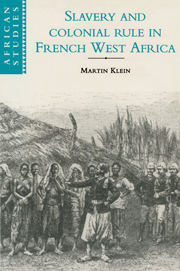Book contents
- Frontmatter
- Contents
- List of illustrations
- List of maps
- List of tables
- Preface
- List of abbreviations
- Glossary
- 1 Slavery in the Western Sudan
- 2 Abolition and retreat. Senegal 1848–1876
- 3 Slavery, slave-trading and social revolution
- 4 Senegal after Brière
- 5 Conquest of the Sudan: Desbordes to Archinard
- 6 Senegal in the 1890s
- 7 The end of the conquest
- 8 The imposition of metropolitan priorities on slavery
- 9 With smoke and mirrors: slavery and the conquest of Guinea
- 10 The Banamba Exodus
- 11 French fears and the limits to an emancipation policy
- 12 Looking for the tracks. How they did it
- 13 After the War: renegotiating social relations
- 14 A question of honor
- Appendixes
- Notes
- Bibliography
- Index
- Titles in the series
14 - A question of honor
Published online by Cambridge University Press: 07 May 2010
- Frontmatter
- Contents
- List of illustrations
- List of maps
- List of tables
- Preface
- List of abbreviations
- Glossary
- 1 Slavery in the Western Sudan
- 2 Abolition and retreat. Senegal 1848–1876
- 3 Slavery, slave-trading and social revolution
- 4 Senegal after Brière
- 5 Conquest of the Sudan: Desbordes to Archinard
- 6 Senegal in the 1890s
- 7 The end of the conquest
- 8 The imposition of metropolitan priorities on slavery
- 9 With smoke and mirrors: slavery and the conquest of Guinea
- 10 The Banamba Exodus
- 11 French fears and the limits to an emancipation policy
- 12 Looking for the tracks. How they did it
- 13 After the War: renegotiating social relations
- 14 A question of honor
- Appendixes
- Notes
- Bibliography
- Index
- Titles in the series
Summary
Slavery having disappeared as a structure, it is discourse and behaviour that constitutes our only access to the reality. Today, though slavery has been abolished for more than a half-century on the level of power as much as production, daily language abounds with references to the noble-slave contradiction, perpetuating the valorisation of one and the symmetrical contempt of the other.
J.-P. Olivier de SardanThough the FulBe no longer have any rights over the RiimaayBe they used to own, the memory of the old relationship is still very much alive in both groups. Individuals vary considerably in how they feel about the past, but it is fair to say in general that the FulBe regret the coming of the French, the loss of sovereignty, and the ‘“theft” of their RiimaayBe labor force, while the RiimaayBe are glad of it.
Paul RiesmanSlavery casts a long shadow into the colonial period and when adjustments in relationships must be made they are made within the weakened idiom of the known world, just as the relationships of the slave period had been accommodated within the idiom of pre-existing kinship systems.
Martin ChanockIn 1958, several months after the referendum that gave France's African colonies self-government, Robin Maugham visited Timbuktu under the auspices of the British and Foreign Anti-Slavery Society. He interviewed both slaves and masters and actually bought a slave. In Timbuktu, slaves had the right to freedom and many took it. Some fled to the city, where they could find work in the quarries, could become prostitutes or could farm.
- Type
- Chapter
- Information
- Slavery and Colonial Rule in French West Africa , pp. 237 - 251Publisher: Cambridge University PressPrint publication year: 1998

